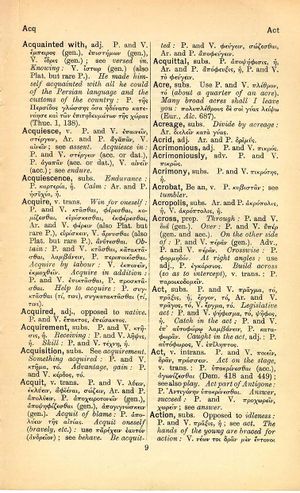acquainted with: Difference between revisions
From LSJ
ἀλλὰ σὺ μὲν νῦν στῆθι καὶ ἄμπνυε → but you, stop now and catch your breath | but do thou now stand, and get thy breath
(CSV3) |
m (Woodhouse1 replacement) |
||
| Line 1: | Line 1: | ||
{{Woodhouse1 | {{Woodhouse1 | ||
|Text=[[File:woodhouse_9.jpg|thumb|link={{filepath:woodhouse_9.jpg}}]] | |Text=[[File:woodhouse_9.jpg|thumb|link={{filepath:woodhouse_9.jpg}}]] | ||
===adjective=== | |||
P. and V. [[ἔμπειρος]] (gen.), [[ἐπιστήμων]] (gen.), V. [[ἴδρις]] (gen.); see [[versed in]]. | [[prose|P.]] and [[verse|V.]] [[ἔμπειρος]] (gen.), [[ἐπιστήμων]] (gen.), [[verse|V.]] [[ἴδρις]] (gen.); see [[versed in]]. | ||
[[knowing]]: [[verse|V.]] [[ἴστωρ]] (gen.) (also [[Plato]] but rare [[prose|P.]]). | |||
[[he made himself acquainted with all he could of the Persian language and the customs of the country]]: [[prose|P.]] [[τῆς Περσίδος γλώσσης ὅσα ἠδύνατο κατενόησε καὶ τῶν ἐπιτηδευμάτων τῆς χώρας]] ([[Thucydides|Thuc.]] 1, 138). | |||
}} | }} | ||
Revision as of 08:53, 20 May 2020
English > Greek (Woodhouse)
adjective
P. and V. ἔμπειρος (gen.), ἐπιστήμων (gen.), V. ἴδρις (gen.); see versed in.
knowing: V. ἴστωρ (gen.) (also Plato but rare P.).
he made himself acquainted with all he could of the Persian language and the customs of the country: P. τῆς Περσίδος γλώσσης ὅσα ἠδύνατο κατενόησε καὶ τῶν ἐπιτηδευμάτων τῆς χώρας (Thuc. 1, 138).

